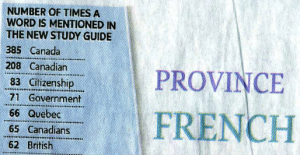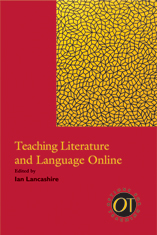A paper that Stéfan Sinclair and I wrote on “Between Language and Literature: Digital Text Exploration” has just be published by the MLA in a volume edited by Ian Lancashire, Teaching Literature and Language Online.
tweenbots: kacie kinzer
Thanks to twitter I’ve discovered the future of robots and they are tweenbots. The tweenbots is a playful project by Kacie Kinzer who let loose simple rolling bots with a flag that identified where they were going. She then videotaped people helping the little robot on its way.
Kokoromi Collective: One Button Games
The Kokoromi Collective have an interesting invitational challenge – One Button games. Design a game with only one button as input. Neat.
Kokoromi is an experimental game collective formed by a rare union of Montreal gamemakers and curators to promote games as an art form and expressive medium worldwide. Based in Montreal, Quebec, Canada, Kokoromi produces events, develops games, and hosts a blog at www.kokoromi.org. (About Us)
GRAND NCE funded
The Graphics, Animation and New Media Canada Network of Centres of Excellence has been funded, see NCE News Release.
New Media, Animation, and Games — these technologies are the building blocks of the Digital Age. The Science, Technology and Innovation Council report in 2008 recognized this as a priority research sub-area within Canada’s Science and Technology Strategy. This application responds to the needs identified in that report. The GRAND NCE will undertake a comprehensive research program whose goal is to understand the underlying technologies and to make selective advances in a coordinated, multidisciplinary setting that lead to social, legal, economic, and cultural benefits for Canadians.
This brings significant challenges because the ability to access, manipulate, and disseminate information in its various media forms radically changes on almost a daily basis. The research program will meet these challenges through a dynamic set of interconnected projects built on a conceptual framework of five themes. Three themes focus on the technology clusters identified by the Science, Technology and Innovation Council: (1) New Media Challenges and Opportunities, (2) Games and Interactive Simulation, and (3) Animation, Graphics and Imaging. The other two cross-cut the first: (4) Social, Legal, Economic and Cultural Perspectives, and (5) Enabling Technologies and Methodologies. Thirty projects each explore a different aspect of selected problems. Fifty Network Investigators lead projects, with Collaborating Researchers and Partners from the public and private sectors participating as domain experts and receptors to exploit the resulting new knowledge and technologies. (Executive Summary)
This truly interdisciplinary NCE is led by Kellog S. Booth at UBC and includes network investigators from across the country. The U of Alberta lead is Jonathan Shaeffer. I’m one of the network investigators at U of A and will be working on serious games. Isn’t that grand!
Information Visualization for Text Analysis
Googling around I came across a nice succinct chapter on Information Visualization for Text Analysis from a book called Search User Interfaces by Marti Hearst (Cambridge University Press, 2009).
The chapter goes from visualizations for text mining to concordances and then to citation relationships. It shows some of the usual suspects like TextArc and Wordle.
Text Analysis in the Wild

The Globe and Mail on November 13th had an interesting example of text analysis in the wild. Crossing pages A10 and A11 they had a box with the high frequency words in the old citizenship guide and the new one with a word cloud in the middle. Here is what the description says:
Discover Canada, a different look at the country
The new citizenship guide, Discover Canada, is much more comprehensive look at Canada’s history and system of government than its predecessor, A Look at Canada, which was produced under the Liberals in 1995. It’s longer (17,536 words to 10,433), with 10 pages devoted to Canadian history, compared to two in the previous version. Its emphasis also differs, with more attention paid to the military, the Crown and Quebec, and less to the environment.
>> Below is a graphi representation of the most frequently used words in the new citizendship guide. The bigger the word the more often it appears.
I had to fold the page to scan it as it is longer than my scanner, but you get the idea. The PDF is here. I would have preferred the two lists at either edge of the box to be closer to let us compare. Note the small print – they used May Eyes and WriteWords which has a word frequency counting tool.
SSHRC, Yasmeen: “Technopreneurship” and social innovation
Lynne pointed me to a blog entry by SSHRC’s Gisèle Yasmeen on “Technopreneurship” and social innovation.
Canada has a grand history of involvement in developing technopreneurs, and not just in the video-game and hand-held device industry. Indeed, Canada has one of the strongest “digital humanities” scholarly communities in the world, with many of these researchers becoming “technopreneurs” in their own right and working with partners across the public, private and not-for-profit sectors. Many of these scholarly “technopreneurs” had their work incubated by SSHRC in the Image, Text, Sound and Technology (ITST) funding program which began in at the beginning of this millennium. Recently, SSHRC awarded one of its Major Collaborative Research Initiatives to a consortium of 35 digital humanities researchers and 21 partner agencies under the leadership of Ray Siemens at UVIC — an indication of how mature this type of activity has become.
Technopreneurs are those who develop new information and communication ideas. I would like to say that they don’t necessarily commercialize their innovations, but see innovation as a human and social enterprise. The digital humanities are more about the gift of innovation than profit.
The Onion: Ultra-Realistic Modern Warfare Game Features Awaiting Orders, Repairing Trucks
Ultra-Realistic Modern Warfare Game Features Awaiting Orders, Repairing Trucks
The Onion has posted a story about a Ultra-Realistic Modern Warfare Game Features Awaiting Orders, Repairing Trucks. Now that’s realism.
glia — neuronal jelly with network sauce — 2009.

Thanks to Jason I discovered an interesting collection of animated poetry that plays with type by David Jhave Johnston. See glia — neuronal jelly with network sauce — 2009.. In theory you can embed the animated poems in things, but it didn’t work in this blog. Perhaps they are best seen in glia.
One feature of Johnston’s work is how he plays with type using, among other technologies, Mr. Softie from Obx Labs.
Collaboration: Digital Humanities And Computer Science
I have now wrapped up my conference report on the Digital Humanities And Computer Science symposium. At the end I was on a panel on collaboration between the digital humanities and computer science. In many ways the DHCS symposium is an example of collaboration and how to build it. Below are the quotes and theses on collaboration that I spoke to.
Continue reading Collaboration: Digital Humanities And Computer Science
